Music Lessons Offer Lifelong Cognitive Benefits
 Music is great for the brain in many ways. Learning to play a musical instrument is an excellent investment in improving brain function and cognitive performance. An interesting new study suggests that the brain boost we get from music lessons may last a lifetime. The study reported by the American Psychological Association examined the cognitive performance of adults (ages 60 t0 83) that studied music in childhood.
Music is great for the brain in many ways. Learning to play a musical instrument is an excellent investment in improving brain function and cognitive performance. An interesting new study suggests that the brain boost we get from music lessons may last a lifetime. The study reported by the American Psychological Association examined the cognitive performance of adults (ages 60 t0 83) that studied music in childhood.
“The high-level musicians who had studied the longest performed the best on the cognitive tests, followed by the low-level musicians and non-musicians, revealing a trend relating to years of musical practice. The high-level musicians had statistically significant higher scores than the non-musicians on cognitive tests relating to visuospatial memory, naming objects and cognitive flexibility, or the brain’s ability to adapt to new information.”
While these findings are tentative and require additional research, they do signal that musical training is a powerful tool for building your Next Brain.
Interested to hear from readers that were trained musically as children. How has that shaped your cognitive skills as an adult?
Categories: Child, IQ and EQ, Memory and Learning, Music and Audio, Older Adult, Perception, Problem Solving, Training Tags:
Need a Brain Boost? Crank Your Favorite Tunes
 Music stimulates our brains and can support peak cognitive performance in many ways. A new study at McGill University has revealed part of the reason – pleasurable music releases dopamine, a powerful neurotransmitter that the brain uses as a reward. The researchers also found that the stronger the emotional reaction to the music the more dopamine that is released. Some details:
Music stimulates our brains and can support peak cognitive performance in many ways. A new study at McGill University has revealed part of the reason – pleasurable music releases dopamine, a powerful neurotransmitter that the brain uses as a reward. The researchers also found that the stronger the emotional reaction to the music the more dopamine that is released. Some details:
The team at The Neuro measured dopamine release in response to music that elicited “chills”, changes in skin conductance, heart rate, breathing, and temperature that were correlated with pleasurability ratings of the music. ‘Chills’ or ‘musical frisson’ is a well established marker of peak emotional responses to music. A novel combination of PET and fMRI brain imaging techniques, revealed that dopamine release is greater for pleasurable versus neutral music, and that levels of release are correlated with the extent of emotional arousal and pleasurability ratings.
You can listen to the music they used in the study here.
Pleasurable music is a powerful and natural source of mental energy. Need a brain boost? Turn to your iPod.
Interested to hear from readers that use music in their brain training or physical workout routines.
Categories: Mental Focus, Music and Audio Tags: EQ
Music Training Pumps Up Your Brain
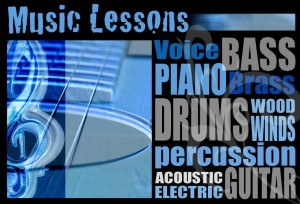 New research from Northwestern University, Taking Music Seriously, confirms that learning to play a musical instrument is a powerful way to improve general brain function and cognitive performance. To quote:
New research from Northwestern University, Taking Music Seriously, confirms that learning to play a musical instrument is a powerful way to improve general brain function and cognitive performance. To quote:
“Now a data-driven review by Northwestern University researchers that will be published July 20 in Nature Reviews Neuroscience pulls together converging research from the scientific literature linking musical training to learning that spills over to skills including language, speech, memory, attention and even vocal emotion. The science covered comes from labs all over the world, from scientists of varying scientific philosophies, using a wide range of research methods.”
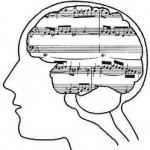 It seems musical training enhances neuroplasticity and primes the brain for improved performance in a variety of communication and learning tasks. These appear to be life-long and life-wide (outside the context of music) effects.
It seems musical training enhances neuroplasticity and primes the brain for improved performance in a variety of communication and learning tasks. These appear to be life-long and life-wide (outside the context of music) effects.
Interested to hear from readers that use musical training for brain fitness and and cognitive enhancement.
Categories: Memory and Learning, Mental Focus, Music and Audio, Training Tags:
Mozart Effect Does Not Improve Spatial Ability
 There is no doubt music has a big impact on how we think and feel. But can it be used to improve brain function and cognitive performance? We have explored this question with several posts on the Next Brain blog including one on the so-called Mozart effect. This effect claims that listening to Mozart’s music can increase your IQ.
There is no doubt music has a big impact on how we think and feel. But can it be used to improve brain function and cognitive performance? We have explored this question with several posts on the Next Brain blog including one on the so-called Mozart effect. This effect claims that listening to Mozart’s music can increase your IQ.
In an earlier post we found that there was some evidence that it can temporarily improve your spatial reasoning ability. Now the Science Daily reports on research from the University of Vienna that even dashes that hope. The study found that there is no evidence for the effect, not even a temporary improvement. It is important to note:
“Their comprehensive study of studies synthesizes the entirety of the scientific record on the topic. Retrieved for this systematic investigation were about 40 independent studies, published ones as well as a number of unpublished academic theses from the US and elsewhere, totaling more than 3000 participants.”
So this negative finding will likely stand. This of course does not mean that more active improvement techniques such as learning to play a musical instrument fail to boost cognitive performance.
Categories: IQ and EQ, Music and Audio Tags: Mozart Effect
Integrative Body-Mind Training Improves Brain Functions in Just Five Days!
 There is growing evidence that a fast-track approach to mediation may in fact produce results in as little as five days. This would be a breakthrough as using mindfulness or mediative techniques to improve your cognitive functioning normally takes months or years.
There is growing evidence that a fast-track approach to mediation may in fact produce results in as little as five days. This would be a breakthrough as using mindfulness or mediative techniques to improve your cognitive functioning normally takes months or years.
The technique is called integrative body-mind training (IBMT) and requires 20 minutes per day for five days. Subjects with no previous training in mediation techniques showed significant improvements in mental focus, mood and stress.
The process involves using a number of techniques together under the guidance of a coach. The seminal article on IBMT, Short-Term Medication Training Improves Attention and Self-Regulation, describes it this way:
“Training in this method is followed by 5 days of group practice, during which a coach answers questions and observes facial and body cues to identify those people who are struggling with the method. The trainees concentrate on achieving a balanced state of mind while being guided by the coach and the compact disc that teaches them to relax, adjust their breathing, and use mental imagery.”
A more detailed description of how this works over a five day period can be found in this Introduction to IBMT written by Dr. Yi-Yuan Tang a pioneer in the field.
I am interested to hear from readers that can recommend a coach, suggest resources or share experiences about IBMT. I’d like to try it and write additional posts for the next Brain Blog.
Source: Image of running man.
Categories: Ancient Ways, Executive Function, Memory and Learning, Mental Focus, Music and Audio, Training Tags: meditation, mindfulness
Does Listening to Classical Music Increase IQ?
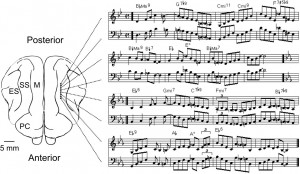 I get this question a lot. It goes back to the craze around the Mozart Effect or the idea you can get smart by listening to Mozart’s music. As far as I can tell there is no (or little) scientific evidence to support the idea. There is some evidence however that listening may temporarily (10-15 min) improve your spatial reasoning skills.
I get this question a lot. It goes back to the craze around the Mozart Effect or the idea you can get smart by listening to Mozart’s music. As far as I can tell there is no (or little) scientific evidence to support the idea. There is some evidence however that listening may temporarily (10-15 min) improve your spatial reasoning skills.
More relevant for readers of the next Brain Blog is the growing evidence that learning to play a musical instrument can improve many cognitive skills and perhaps raise IQ. Scans reveal musician’s brains look different and they tend to score higher on standardized tests for spatial-temporal tasks, verbal memory and even math. One study suggested a small increase in IQ of children taking music lessons.
As learning to play a musical instrument brings intrinsic satisfaction, it may be a particularly good option for building YourNextBrain! Interested to hear from reader with brain boosting experiences related to learning an instrument.
Source: Image of brain and sheet music
Categories: Child, IQ and EQ, Memory and Learning, Music and Audio, Training Tags: Mozart Effect
Audio Drugs for Your Brain?
 You can alter your brainwaves by playing sounds of slightly different frequency in each ear. Under the proper circumstances your brain stem will reconcile the difference by creating a rhythmic pulsing sound called a binaural beat. This is something you can actually hear but it is not really there. Your brainwaves may change in response to this auditory hallucination.
You can alter your brainwaves by playing sounds of slightly different frequency in each ear. Under the proper circumstances your brain stem will reconcile the difference by creating a rhythmic pulsing sound called a binaural beat. This is something you can actually hear but it is not really there. Your brainwaves may change in response to this auditory hallucination.
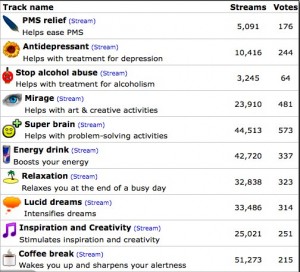 There have been many claims made about the effects of binaural beats from reducing anxiety to improving creativity and even producing drug-like feelings of happiness or euphoria. The hope that we can engineer a binaural beat experience, much like a drug, to create a specific brain boosting effect is very exciting. The idea of an audio or digital drug has caught on and there is even one company, i-Doser Labs, that markets binaural beats by the dose. You can try free doses HERE for improving energy, mental focus, lucid dreaming or even building a superbrain.
There have been many claims made about the effects of binaural beats from reducing anxiety to improving creativity and even producing drug-like feelings of happiness or euphoria. The hope that we can engineer a binaural beat experience, much like a drug, to create a specific brain boosting effect is very exciting. The idea of an audio or digital drug has caught on and there is even one company, i-Doser Labs, that markets binaural beats by the dose. You can try free doses HERE for improving energy, mental focus, lucid dreaming or even building a superbrain.
The question is, do binaural beat products really improve the performance of our minds and brains? Many people that use the products claim that they work. I have not been able to find many scientific or clinical studies on their effectiveness. We will continue to explore this issue on the Next Brain Blog.
If you have experience with binaural beat products or know of empirical studies on their effectiveness please leave a comment.
Source: Image of constructive interference pattern that creates binaural beat.
Categories: Music and Audio Tags: Brainwave Entrainment
Enhanced Music Accelerates Brain Function
There is no doubt music stimulates our brain. Listening to your favorite song can generate a flood of emotions and memories. But can music be used to enhance mental focus, IQ, memory or otherwise build your NextBrain?
According to Volition Thought House the answer is yes. They have developed a way to spike normal music with beat patterns and frequencies to build your brain strength automatically while listening. The product is called iMusic and is an example of Brainwave Entrainment.
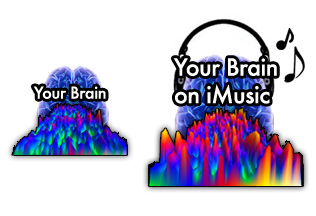 The company has done several small research studies that demonstrate positive effect (including one that shows improved sleep), has a patent and explain the technology fairly clearly in several white papers.
The company has done several small research studies that demonstrate positive effect (including one that shows improved sleep), has a patent and explain the technology fairly clearly in several white papers.
You can get a free sample here but have to listen to a lot of commercials. If you do the free sample be sure to hit “play list” and watch the 3rd testimonial. It is by a physician that took a hard look and was impressed.
I tried an earlier free sample and loved it! Perhaps it is a placebo effect but I felt more focused and energized while listening. Products range from $20-$120 and I’ve placed an order.
I will blog on my experiences later. Meanwhile please share your ideas and experiences with music-based cognitive improvement techniques.
Categories: IQ and EQ, Memory and Learning, Mental Focus, Music and Audio, Sleep Tags: Brainwave Entrainment
